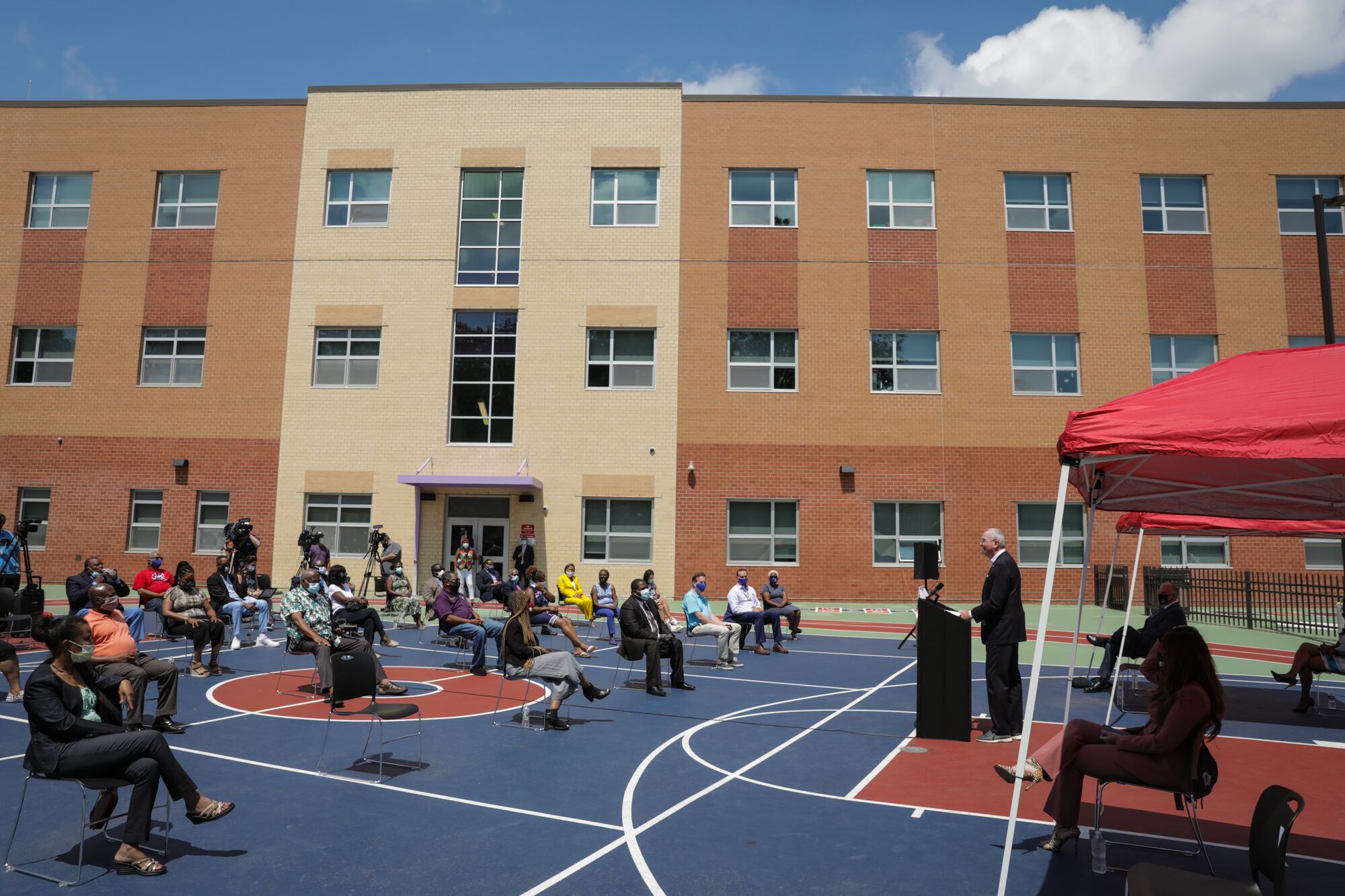New Jersey will allow schools to postpone the reopening of classrooms, officials said Wednesday.
Districts that cannot meet the state’s safety guidelines for in-person classes can begin the school year with all-remote learning, but they must submit plans and timelines for eventually bringing students back into schools, Gov. Phil Murphy said at a press conference Wednesday.
“We have the ultimate objective of getting some form of in-person education,” he said, “but do it safely and responsibly and at the right time.”
The decision to let schools start with all-remote learning is a significant departure from Murphy’s push for schools to offer at least some in-person learning, and a concession to teachers unions and many families who argued against reopening classrooms while the coronavirus continues to sicken people nationwide.
The policy change stops short of ordering all schools to open virtually, as the heads of the state’s teachers, principals, and superintendents unions urged Murphy to do in a joint statement issued late Tuesday.
That will leave individual districts to decide whether to risk bringing students and employees back to school. Already, several major charter school networks in Newark and some traditional school districts have announced plans to open virtually, and Newark Mayor Ras Baraka advised against sending students back into classrooms.
The Willingboro school district is western New Jersey is planning for all students to learn remotely until November, Superintendent Neely Hackett said at Wednesday’s press conference. The delayed start of in-person learning will give the district more time to ensure schools are properly ventilated, face masks and laptops are available for every student, and teachers and custodians are trained on the new safety protocols, she said.
“There is still much work that needs to be done to ensure the safety of our students and staff,” she said.
It remains to be seen whether the new guidance will lead to changes in Newark, the state’s largest district, which has said any students who choose to return to schools next month will be able to attend class in person five days a week. (Under the state’s current guidelines, families can also request fully virtual learning; Newark families have through Friday to select that option.)
As recently as Tuesday, Superintendent Roger León told teachers that classrooms are still expected to reopen in a few weeks, even though certain protective equipment, such as plastic barriers that sit atop student desks, have yet to arrive.
“We can’t wait for your return to make an impact on students’ lives,” he said during an online information session with the Newark Teachers Union.
More than 450 Newark residents have been infected and about 30 residents have died since June 30, a sharp decline from the peak in April but a grim reminder that the coronavirus continues to pose potentially fatal risks. The virus is also still spreading statewide, with nearly 500 new infections reported Tuesday, but that is also far below the levels in April when thousands of new daily infections were reported.
Still, some lawmakers and the state’s education labor unions believe that it is not yet safe to resume in-person learning.
“Reopening schools for in-person instruction under the current conditions poses too great a risk to the health of students and schools staff,” said the leaders of the the New Jersey Education Association, the New Jersey Principals and Supervisors Association, and the New Jersey Association of School Administrators in a lengthy statement Tuesday. “That is why we are calling on Gov. Murphy and the New Jersey Department of Education to direct all New Jersey public schools to open remotely this fall.”
The unions note that districts in other states have reopened only to quickly switch to all-remote learning after outbreaks of the virus. Also, while children are less likely to become seriously ill from COVID-19 and young children appear less likely than adults to spread the virus, recent data shows a sharp increase in infections among children, the statement says.
The unions also cite “inadequate levels of funding, staffing, equipment and facilities” as districts scramble to prepare for in-person classes. On Monday, the Elizabeth school board voted to start the year remotely due to a shortage of teachers willing to return to classrooms; last week, the Jersey City board approved an all-remote reopening plan.
All New Jersey districts should use the remaining time before the new school year to fine-tune their remote learning plans, which could include distributing laptops and training staff to provide virtual special education services, rather than preparing for “the dangerous, uncertain” return to in-person learning, the unions said.
“We remain committed to getting back to in-person instruction as soon as it is safe,” the statement said. “It is not safe yet.”
In Newark, many teachers and parents have expressed doubt that schools can safely reopen. They question whether schools will be able to enforce new safety regulations, such as mandatory face masks and physical distancing, and worry that the district’s older buildings do not allow for adequate air circulation.
However, others say that in-person learning is critical, both for working parents who cannot supervise their children’s learning during the day and students whose academic skills and mental health suffered during several months of mandatory remote learning this spring. They also say some families still do not have laptops for every child or reliable internet connections, which are crucial for virtual learning.
“In order for students, especially our neediest groups, to get the best support,” a Newark educator said in a recent survey, “that needs to be in person.”





